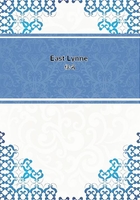
第202章
"Caught it from him?" she rejoined, carried away also by impulse. "It is more likely that he----"
She stopped herself just in time. /"Inherited it from me,"/ had been the destined conclusion. In her alarm, she went off volubly, something to the effect that "it was no wonder she was ill: illness was natural to her family."
"At any rate, you have become ill at East Lynne, in attendance on my children," rejoined Mr. Carlyle, decisively, when her voice died away.
"You must therefore allow me to insist that you allow East Lynne to do what it can toward renovating you. What is your objection to see a doctor?"
"A doctor could do me no good," she faintly answered.
"Certainly not, so long as you will not consult one."
"Indeed, sir, doctors could not cure me, nor, as I believe prolong my life."
Mr. Carlyle paused.
"Are you believing yourself to be in danger?"
"Not in immediate danger, sir; only in so far as that I know I shall not live."
"And yet you will not see a doctor. Madame Vine, you must be aware that I could not permit such a thing to go on in my house. Dangerous illness and no advice!"
She could not say to him, "My malady is on the mind; it is a breaking heart, and therefore no doctor of physic could serve me." That would never do. She had sat with her hand across her face, between her spectacles and her wrapped-up chin. Had Mr. Carlyle possessed the eyes of Argus, backed by Sam Weller's patent magnifying microscopes of double hextra power, he could not have made anything of her features in the broad light of day. But /she/ did not feel so sure of it. There was always an undefined terror of discovery when in his presence, and she wished the interview at an end.
"I will see Mr. Wainwright, if it will be any satisfaction to you, sir."
"Madame Vine, I have intruded upon you here to say that you /must/ see him, and, should he deem it necessary, Dr. Martin also."
"Oh, sir," she rejoined with a curious smile, "Mr. Wainwright will be quite sufficient. There will be no need of another. I will write a note to him to-morrow."
"Spare yourself the trouble. I am going into West Lynne, and will send him up. You will permit me to urge that you spare no pains or care, that you suffer my servants to spare no pains or care, to re-establish your health. Mrs. Carlyle tells me that the question of your leaving remains in abeyance until her return."
"Pardon me, sir. The understanding with Mrs. Carlyle was that I should remain here until her return, and should then be at liberty at once to leave."
"Exactly. That is what Mrs. Carlyle said. But I must express a hope that by that time you may be feeling so much better as to reconsider your decision and continue with us. For my daughter's sake, Madame Vine, I trust it will be so."
He rose as he spoke, and held out his hand. What could she do but rise also, drop hers from her face, and give it him in answer? He retained it, clasping it warmly.
"How should I repay you--how thank you for your love to my poor, lost boy?"
His earnest, tender eyes were on her blue double spectacles; a sad smile mingled with the sweet expression of his lips as he bent toward her--lips that had once been hers! A faint exclamation of despair, a vivid glow of hot crimson, and she caught up her new black silk apron so deeply bordered with crape, in her disengaged hand, and flung it up to her face. He mistook the sound--mistook the action.
"Do not grieve for him. He is at rest. Thank you--thank you greatly for your sympathy."
Another wring of her hand, and Mr. Carlyle had quitted the room. She laid her head upon the table, and thought how merciful would be death when he should come.